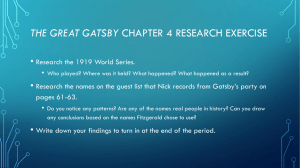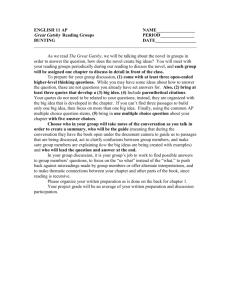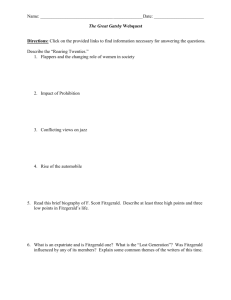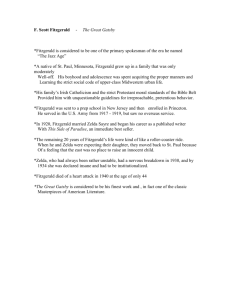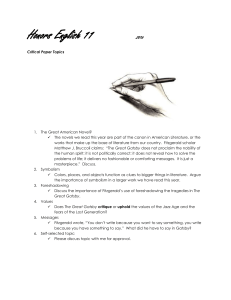Name ____________________________________ (1896 – 1940) Early Life
advertisement
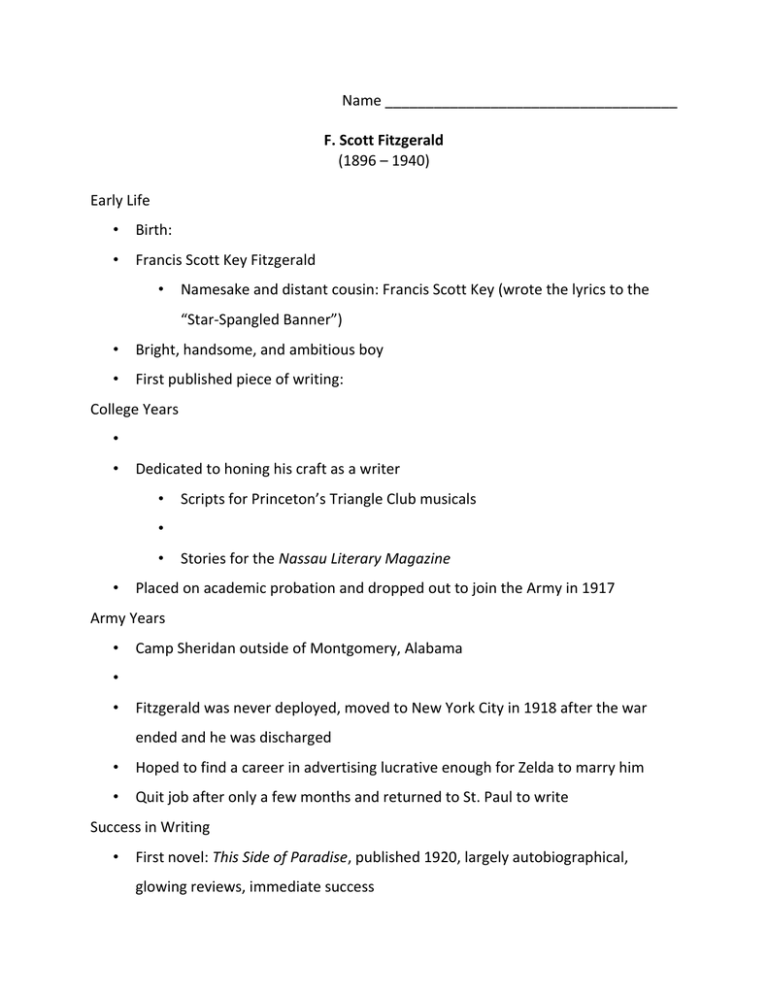
Name ____________________________________ F. Scott Fitzgerald (1896 – 1940) Early Life • Birth: • Francis Scott Key Fitzgerald • Namesake and distant cousin: Francis Scott Key (wrote the lyrics to the “Star-Spangled Banner”) • Bright, handsome, and ambitious boy • First published piece of writing: College Years • • Dedicated to honing his craft as a writer • Scripts for Princeton’s Triangle Club musicals • • • Stories for the Nassau Literary Magazine Placed on academic probation and dropped out to join the Army in 1917 Army Years • Camp Sheridan outside of Montgomery, Alabama • • Fitzgerald was never deployed, moved to New York City in 1918 after the war ended and he was discharged • Hoped to find a career in advertising lucrative enough for Zelda to marry him • Quit job after only a few months and returned to St. Paul to write Success in Writing • First novel: This Side of Paradise, published 1920, largely autobiographical, glowing reviews, immediate success • Almost overnight, Fitzgerald, 24, becomes one of America’s most promising young writers • • 1921: Celebrity Status • Embarked on an extravagant lifestyle that earned him a reputation for being a playboy and hindered his reputation as a serious literary writer • Fitzgerald supported himself financially by writing great numbers of short stories for popular publications such as The Saturday Evening Post and Esquire • “The Diamond as Big as the Ritz” • “The Curious Case of Benjamin Button” • Second Novel • 1922: • Helped to cement his status as one of the great chroniclers and satirists of the culture of wealth, extravagance, and ambition that emerged during the affluent 1920s—what became known as the Move to France • 1924, seeking a change of scenery to spark his creativity • 1924-25: Wrote The Great Gatsby in Valescure, France The Great Gatsby • Published • Well received, but it wasn’t until the late 1950s that the novel achieved its status as the definitive portrait of the “Roaring Twenties” and one of the greatest American novels ever written Later Years • After finishing The Great Gatsby, Fitzgerald’s life began to unravel. • • Zelda also suffered from mental health issues, and was institutionalized more than once Tender Is the Night • Finally published in 1934, after years of turmoil • Commercial failure and initially poorly received • Has since gained in reputation and is now considered another great American novel Hollywood Years • After another two years lost to alcoholism and depression, Fitzgerald moved to Hollywood to attempt to revive his career as a screenwriter and a freelance storywriter • Began working on another novel, Death • Fitzgerald died of a heart attack on December 21, 1940 in Hollywood, California at the age of 44 • At the time of his death, Fitzgerald believed himself to be a failure-–none of his works received more than modest commercial and critical success during his lifetime • Fitzgerald has since gained a reputation as one of the greatest authors in the history of American literature due almost entirely to the enormous posthumous success of The Great Gatsby

